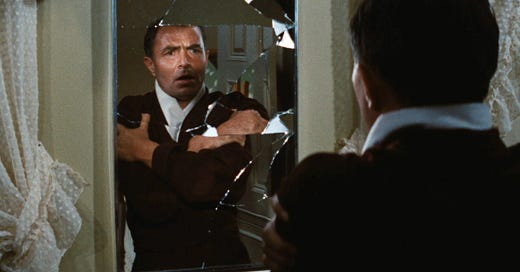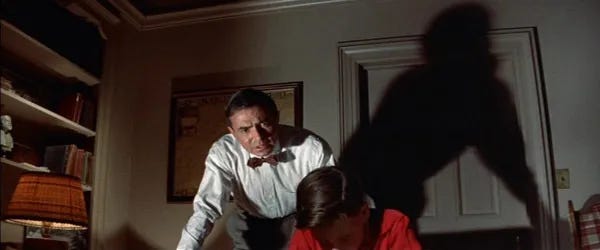I’d also contract a terminal illness if I were as obsessed with PROVIDING as Ed Avery is. In Bigger Than Life, Ed works two jobs—as a schoolteacher and part-time as a cab dispatcher—to support his wife, Lou, and their son, Ritchie. They’re not begging him for more, and appear content with their simple suburban home. Still, Ed is sensitive to the grander pressure that emanated from post-war, Eisenhower-era expectations of upward mobility. He’s exhausted because nothing feels like enough and because he hasn’t met his own expectations for his adult life.
The inexplicable pains he begins to feel in his body are an obvious metaphor. He learns from a doctor (he can’t afford him) that he has a disease that causes an inflammation of his arteries. It’s pretty much a doomed case, but he can try this experimental medicine, *cortisone*, in the hopes that it’ll extend his life and keep his pain to a minimum. And then the treatment becomes its own sort of metaphor.
While it works at first, it makes Ed somewhat of a manic depressive. He’s crying on a sofa one moment, and the next he’s like me after I’ve taken a second Adderall forgetting I had already taken one. Lou worries, but Ed eventually does seem to be better, and she looks the other way at a different sickness taking hold of him. The cortisone causes Ed to become a psychotic version of the man he, at his most insecure, wished he could be. At a comic parent-teacher night, he berates the parents for their softness. He talks of children as if they are animals needing to be tamed. He wants to make perfect little men and women out of them, and when we later see him toss the old pigskin with his son, we see what the cortisone has really made of him. He’s hyper-competitive, hyper-fixated on his class and what his wife looks like to others, and with Richie he’s determined to raise the perfect American Man, the version of himself he could never be.
There’s another great scene, where the film’s cinemascope—most commonly used in the cheerier pictures of the era—is most evocative. In a dimly lit room, Ed tortures Richie with a math problem from his homework. Ritchie is exhausted and starving, but Ed has decided that Richie can’t eat dinner until he gets the problem right. He stands hulking behind Ritchie, looking like Pennywise before an attack, and his shadow fills the background. Ray’s made a horror film.
—
Even before rewatching Bigger Than Life, I’ve been working on this project for some time now and have been thinking a lot about expectations. The expectations I have for myself, and the ones imposed on me by loved ones and ~the culture~. Even if your parents are easy-going and don’t oppress you with their visions of what they believe your life should be, it’s still challenging—for all of us, I’m sure—to not feel like a disappointment sometimes. Anytime I act a certain way or say a certain thing I feel may defy what someone wants for me, I feel an enormous sense of guilt.
The pressure Ed feels in Bigger Than Life is more urgent. He does have a wife and child to support. There’s a water heater on the fritz and there are hints that there are expenses that can barely be paid for. You understand how he’s become existential about his manhood, and baked into Ray’s film is this fear about not being a Good Enough Man. It’s a bit amorphous, but that’s what all of his anxiety boils down to.
I think of the things that make me feel this way sometimes, and a lot of them seem to stem from that specific brand of post-war *America is the greatest country in the world* vibe. Suburban life is still idealized. So is child-rearing and, like, the six types of careers that people, to do this day, see as aspirational. I guess these notions can be more or less reinforced depending on where you come from, but I do believe they linger in all of our minds. I once joked to a friend that the greatest thing about being gay is that you’re such a disappointment already you have less conflict with yourself about doing the things you want to do. It’s my straight friends, the ones who take little acts of rebellion against their family’s expectations (not marrying in their 20s, still living in the Big Apple, pursuing the Arts), that feel the most conflicted.
And yes, while I don’t feel direct pressure to marry, buy a home, and have children, sometimes it feels like I’m hardwired to think badly of myself because this isn’t the direction I want for myself. I sometimes feel like I’m doing a bad job at being a Good Enough Man. Maybe I should look into cortisone…





